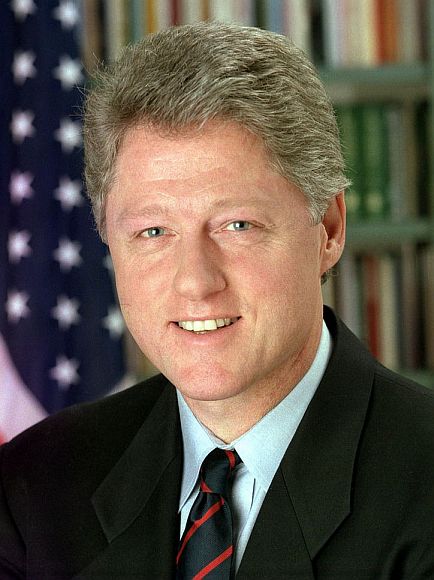

 By VennerRoad, 15th Oct 2016
By VennerRoad, 15th Oct 2016
False allegations of rape and lesser unacceptable sexual behaviour are endemic in Western societies, none more so than against celebrities.

Bill Clinton
The Islamic world in particular does not appear to suffer from these maladies, probably because the collective wisdom of centuries of jurisprudence has not been swept aside by hysterical feminists and their fellow travellers. In the West though, any allegation however outrageous, however ancient, is treated as though it is credible. The folly of this can be seen in the recent Operation Yewtree witch-hunt of ageing celebrities.
Historical allegations are particularly outrageous in that they are almost always impossible to disprove, and when several women (or on occasion men) come forward making similar claims from decades ago, there is a tendency to give them a credibility they do not deserve. At the time of writing, Bill Clinton is back in the spotlight, and an old tape of Donald Trump making what he called locker room comments about women has prompted another gaggle of accusers to come forward pointing the finger at him.
A charitable view of such accusers is that they have rewritten in their minds sexual encounters which were consensual or even imaginary so that now they become rape. The reality though is that most of the current crop are simply lying, for whatever reason. Stefan Molyneux * has dealt with the Trump allegations more than adequately in a recent podcast; the bottom line is that Trump was not boasting about sexually assaulting women but talking about his encounters with certain types of women – power groupies. Some of these allegations are totally absurd; Trump has been accused of kissing women without asking their permission. How often do men actually ask women their permission before kissing them, or vice versa? There are occasions when this is simply done, particularly in show business.
What though of Bill Clinton? Before going any further, let us reiterate, there are some women who are attracted to powerful men, or men who have the perception of power. These men can be politically powerful – like Clinton; businessmen – like Trump. Or they can be famous for other reasons: rock stars, actors, even a celebrity chef may attract the wrong type of fan.
Trump has made much of old allegations against Clinton, in particular one by Juanita Broaddrick that Clinton raped her in April 1978. Because Broaddrick is not a wide-eyed fanatic, and because her testimony is related in a fairly even if at times emotional tone, she makes a convincing witness, superficially.
According to airhead Laci Green, we should believe her and other celebrity accusers simply because...
What are the facts though? You will find interviews with Broaddick on YouTube, but to claim her story has altered over the years is a classic understatement.
Clinton had all the characteristics of a man who attracts false allegations: handsome, intelligent, charismatic, and going places. There was no doubt he loved the ladies, nor that they loved him. Even men who have worked for Clinton, including at least one former bodyguard, all speak highly of him, but not so highly of his wife. But Clinton had one fatal personal flaw, he couldn’t keep it inside his trousers. At the time of the Monica Lewinsky scandal, Paula Jones was suing him for sexual harassment. These allegations had been made years previously but as is often the case in civil litigation, the case had dragged on and on. Jones claimed to have been propositioned by Clinton through his bodyguard Danny Ferguson in May 1991.
At the time, Clinton was Governor of Arkansas. An aside here, three years later by which time Clinton was in the White House, Ferguson’s ex-wife would commit suicide at the age of 37. For some conspiracy cranks this proves the long arm of Clinton was able to order the assassination of his enemies as well as rape women with total impunity, although it remains to be seen what real connection he had with this poor woman. It also begs the question if he could kill her, why couldn’t he do the same to the clearly irksome Paula Jones?
In order to bolster her testimony, Jones sought and found Broaddrick, who submitted an affidavit (as Jane Doe #5) to the effect that she had known Clinton in the 1970s, but not in the Biblical sense. She denied any sexual assault on her by Clinton. Clearly this did not advance the Jones case one millimetre, yet in February 1999, Broaddrick went on national television to claim Clinton had raped her in a hotel room in 1978. When asked why she hadn’t reported this as the time, she came up with a typically pathetic response – I didn’t think I would be believed.
This begs the question, if she didn’t think she would be believed when she had a bloody lip, bruising on her lower body and a vaginal full of semen, why should anyone believe her then or now?
Broaddrick’s story is undermined further by her attending a Clinton fund-raiser three weeks later; she was still in denial, she said.
For feminists, stories of this nature are totally credible. While it is true that some women delay reporting rape, and some never report it, these are generally women who are genuinely vulnerable. The problem with the feminist approach is that there is no such thing as a false allegation. As with the specious rape trauma syndrome, anything a woman does or does not do is consistent with her having been raped.
As with the mythology around Bill Cosby, what we might call the Demon Clinton mythology has taken on a life of its own, now any absurd allegation about Clinton is to be taken at face value. He has even been accused of raping one woman who denies it herself.
Clinton is far from the first powerful politician to have been falsely accused of sexually assaulting a gaggle of demented women. Back in the 1990s, the former Premier of Nova Scotia stood trial for historical sex crimes; Gerald Regan was cleared of all charges.
Although he was accused of only one rape, the Australian politician Theo Theophanous saw his career go down the tubes; the woman who accused him was a total head case, but that didn’t matter.
Of course, it takes only one false allegation from one accuser to destroy a man’s reputation, his career, or even his life. That Bill Clinton has survived is probably more indicative of the fact that most people believe the allegations against him are politically motivated or that he is such a splendid chap that he couldn’t possibly have done any of these dreadful things. Both these approaches are flawed, but a dispassionate examination of the facts shows his accusers have little if any credibility.
In the UK, the aforementioned Operation Yewtree saw the police taking an entirely different and sinister approach. At one time the UK police were rightly skeptical of any woman who accused a man of rape unless she looked the part, namely she reported the rape promptly and had physical evidence of if not a sexual assault then some form of violence. This is very reasonable because women are not damsels, nor have they ever been, and most genuine rape victims fight back.
The explosion of rape allegations in recent years has not been due to women suddenly having the courage to come forward where before they didn’t, but for other reasons including confusing consent with desire. Nevertheless, what we saw with Operation Yewtree and especially with the Cliff Richard case was the police deliberately provoking victims into coming forward with historical allegations however baseless. There seemed to be a belief that if three people could be persuaded to make a broadly similar allegation against a celebrity, then alt least one of them must be true. The actor William Roache was the first to face trial on multiple charges dating back to the 1960s. In spite of the passage of time, his legal team was able to prove his accusers were lying.
The allegations against the comedian Jim Davidson never got as far as a courtroom, although there must surely have been a case for charging at least one of his accusers with attempting to pervert the course of justice, or even with conspiracy to pervert the course of justice, because in his book No Further Action, Davidson said it was clear that the police on his case had actually colluded with one of his accusers; after he refuted her claim of a sexual assault at the London Palladium, she altered her witness statement to claim it had occurred elsewhere.
Whatever the role of the police, it is clear that the media is in large part responsible for these feeding frenzies against celebrities, be they politicians, showbiz types or other. This is largely because of the rise of the alternative media. In a pre-Internet world, tabloid newspapers had to tread carefully because of the law of defamation. While it is still possible to sue for defamation, there is now absolutely no silencing any crank, liar, fantasist or hatemonger who opens a YouTube account, indeed the removal of even the most scurrilous of videos or blog posts is seen as a cover-up. The only time most ordinary people see the light is when their own names are dragged through the mud.
Politicians especially are reviled at times, not always unjustly, but the very least we should expect is the mainstream media to hold itself to higher standards than what might rightly be called anti-social media. Don’t hold your breath waiting for that to happen.
* The Stefan Molyneux podcast can also be found at this archived link.
To Wikinut Articles Page